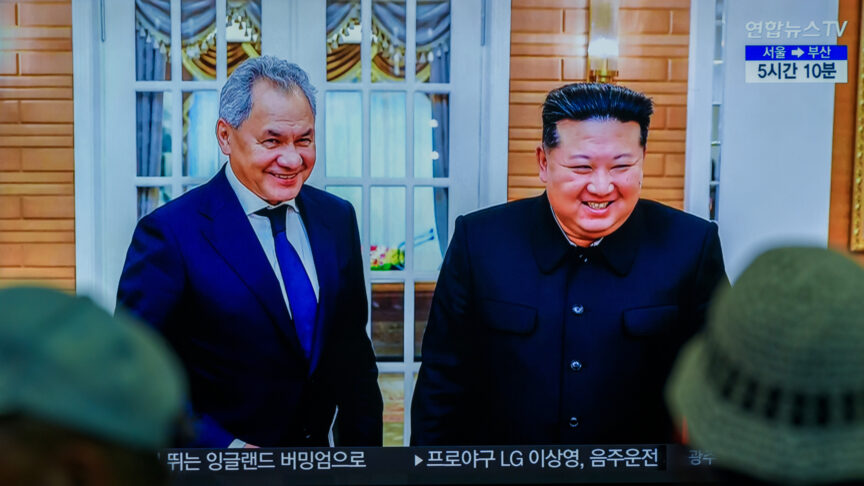China’s Europe tour overshadowed by US relations
Fran?ois Godement argues the Chinese Premier’s European trip will do little to mask recent diplomatic disputes
This article was published in the EUobserver on 29 January 2009.
We are on the eve of a five-country tour (including Brussels) of Europe by Chinese Premier Wen Jiabao. The event looks like a hastily put together trip after China’s last minute no show at the annual EU-China summit on 1 December in Lyons. Wen’s trip offers plenty to gossip about for foreign policy pundits, since it glaringly skirts around France, whose president had been earlier pilloried by Chinese officials for meeting with the Dalai-Lama in his capacity as EU chair.
But we have a world crisis on, so there is not a peep in the media about Wen’s peripatetic dealings with the EU and five European countries, including Germany, the UK and Switzerland. Instead, public attention has focused on the new US Treasury Secretary Timothy Geithner’s confirmation hearing in the Senate, and specifically on one sentence in the 102 page-long document he submitted for that hearing: “President Obama – backed by the conclusions of a broad range of economists – believes that China is manipulating its currency.”
Time will show whether this snippet of a sentence is really a harbinger for Sino-American relations. It is in fact mitigated by another sentence: “The question is how and when to broach the subject in order to do more good than harm.” Indeed. But that’s not the issue for Europeans. The point is that, as the global financial crisis charges on, the world’s economic axis is still perceived to lie between Washington and Beijing, not between the US and Europe, and even less between China and Europe.
Imbalances, not just numbers, are what matters. There is wide-spread agreement that the huge capital imbalance between China and the US was the first contribution to the bubbles that burst last year. Economists may differ on where to put the blame – the insatiable US preference for spending over saving, or the equally boundless Chinese policy of saving over spending. Whatever the cause, it is the resolution of this imbalance which is the priority to solving the crisis. Eurozone countries as a whole haven’t had such a role in this crisis, and so they don’t matter as much in the solution. The China-US “Strategic Economic Dialogue” is paramount. And this is true even if our own trade and economic interests will be deeply influenced by the form of the solution to come.
Some would go farther. Zbignew Brzezinski did recently, writing that the world needs an informal G-2 between the US and China. He lists solely geopolitical issues for co-operation, even including the Israel-Palestinian conflict, an unlikely candidate for Sino-American partnership, unless one imagines China is both willing and able to have control over Iran’s basic security choices. What is left unspoken is obvious: China and the US must cooperate because their economies have become inseparable twins.
Yet if there is a core tenet from the Obama campaign it is that his administration should be more forthcoming in political dialogue with allies, if no less demanding. And that it should also be more considerate of multilateral processes and policies. Indeed, the Bush administration had come to rely on Beijing as a backstop solution to many strategic issues. Occasionally, they formed unholy alliances, for instance in resisting the jurisdiction of the International Court of Justice, or the setting of clear targets for greenhouse gases.
So if Obama the president follows Obama the candidate, a policy of engagement towards China should be conducted in a widely open framework, not as bilateral diplomacy by stealth of the kind that Brzezinski – or Kissinger, still another loud voice for a Washington-Beijing condominium – crafted under Cold War circumstances.
That’s all fine and well, but will allies rise to the occasion? Europe is facing a dilemma that the coming Wen Jiabao trip will highlight. We haven’t thought out a common path on Tibet related issues – perhaps not the world’s greatest priority, but certainly a major hurdle in relations with China, one of our two main external partners. China hasn’t helped of course: its concept of Europe is that it must acquiesce with China, or Beijing will play games with individual member states.
The European Union has launched a set of dialogues with China that mirror Sino-American consultations, including a High-level Economic Mechanism. They would seem to be essential at a time of global financial and economic crisis. But can they work when there is not much policy co-ordination inside Europe, and perhaps no unity of views? The UK’s Gordon Brown has begun pitching to China a higher contribution and profile within the IMF, and has also issued a plea for global co-ordination to fight the crisis. But Wen’s most substantial financial dialogue in Europe is therefore not about Europe itself.
And so, beyond a Chinese visit that risks being based on the divisions of Europe more than on a dynamic China-Europe relationship, Europeans must simply get better at the game of engaging China, defending their own interests, leveraging with Beijing if needed and yielding when otherwise. Until that moment comes, a flutter in Sino-American relations is likely to be more influential than any event between China and Europe.
The European Council on Foreign Relations does not take collective positions. ECFR publications only represent the views of their individual authors.


